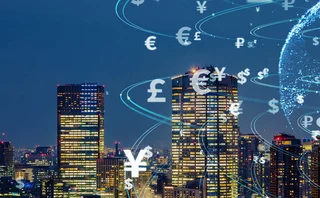
Emerging Markets Exchanges Embrace New Tech
While economic measures might place markets in Kenya, Tanzania, Palestine and elsewhere firmly in the “emerging” bracket, their use of technology is anything but.
Need to know
- While exchanges in emerging markets are increasingly working with big data, many are still unsure about practical uses for blockchain technology.
- For smaller exchanges, cost is a crucial factor when it comes to purchasing expensive technologies from the likes of Nasdaq and London Stock Exchange Group (LSEG).
- Within the “emerging markets” spectrum, the scope is very wide. Some exchanges still deal with first-generation products like equities and bonds, while others are developing sophisticated technologies to catch-up with developed markets.
- With the advent of AI and a stronger familiarity with mobile technology, however, some may be able to leapfrog developmental phases that developed markets are still going through.
The very smallest exchanges may still be entirely reliant on outsourcing from larger groups, but others are building their own technology, embracing mobile trading and increasingly examining the potential for artificial intelligence and distributed-ledger technology (DLT) to disrupt—and perhaps, enhance—their own tech base.
In many cases, this may also allow them to leapfrog painful and unnecessary steps in technology development that more mature exchanges have had to experience.
Indeed, the technical sophistication on hand can rival even the most advanced operators.
In and Out
In emerging markets, two firms still dominate technology provision at a base level—Nasdaq and the London Stock Exchange Group (LSEG). Their technology, including matching engines and surveillance platforms, is ubiquitous throughout the Middle East, Africa and Asia.
“We have full end-to-end technological solution[s] provided by Nasdaq,” says Ahmad Aweidah, CEO at the Palestine Exchange (PEX). “We are actually Nasdaq’s oldest client in the Middle East and North Africa region.”
PEX provides an interesting case in point. Established in 1995, it is one of the newer exchanges in the region, the first fully automated stock exchange in the Arab world, and also the only Arab exchange that is privately owned, rather than being state-operated. Using Nasdaq’s technology has allowed it to punch above its weight in terms of sophistication, like its African neighbor, the Nigerian Stock Exchange, which makes extensive use of Smarts and Nasdaq’s corporate tools.
“Just from a day-to-day running of the exchange, we are highly automated,” says Oscar Onyema, chief executive of the bourse. “From delivery of financial statements and market moving news, which is all automated, to how we do accounting and human resources systems. And even the way we regulate our broker-dealer ecosystem.”
Yet even when some markets take external technology, there may be an element of internal customization necessary. This was the case for the Bombay Stock Exchange (BSE), the oldest in Asia—established in 1875—and likely one of the more advanced emerging-market stock exchanges in the world.
It uses technology from Frankfurt-based exchange giant Deutsche Börse, but the German-developed technology wasn’t exactly suitable for Indian idiosyncrasies. That required some work on their part.
“We took that software, but the Indian requirements are slightly different so we had to make modifications to [suit] Indian needs,” says Ashishkumar Chauhan, CEO at the BSE. “So that then becomes compliant with the Indian regulations.”
As a result, the BSE, which has over 5,000 listings, now claims that it has the ability to take 500,000 orders per second, with a response time of six microseconds—hardly the stuff of dusty, primitive frontier markets.
“In regulatory technology, clearing, settlement, and risk management, we are far ahead of the rest of the world on real-time technologies,” Chauhan says. Waters was unable to definitively confirm this claim in time for publication.
On a regional level, local operators are beginning to challenge the dominance of LSEG and Nasdaq in tech provision. The Korea Exchange, for instance, is building technology for the Hanoi Stock Exchange, following approval from Vietnam’s Ministry of Finance. And in Africa, the Johannesburg Stock Exchange—by far the largest and most sophisticated market on the continent—is continuing to quietly burnish its credentials as a technology provider in its own right, and one which is beginning to even uproot the LSEG and Nasdaq in certain markets.
To start this process, the JSE took an interesting approach—rather than directly sell at the sometimes-large fees charged by LSEG and others, it allowed neighboring exchanges to use its own installations of that technology.
“Many years ago, even before I was at the exchange, the JSE did make the offer to various of the regional exchanges to piggy-back on their system,” says Tiaan Bazuin, CEO of the Namibian Stock Exchange. “This was round about the time when they were in-sourcing from London. Only Namibia took up the offer, but it has worked very well for us because [of] the very low-cost solution, and for small exchanges you really need to control your cost base more than anything else, which we have done very successfully.”
Indeed, it’s not just the JSE, but South Africa more generally which is beginning to flex its muscles as a regional technology powerhouse. The Nairobi Securities Exchange (NSE), for instance, uses LSEG technology for its cash markets, but South African technology for its fixed-income and derivatives segments. Likewise, the Dar es Salaam Stock Exchange switched from the LSEG’s MillenniumIT platform in 2014 to one provided by South Africa-based Securities and Trading Technology for its trading, clearing and depository settlement needs.
“For us [as] a small market, [the] cost element is very important to what we do,” says Moremi Marwa, CEO of the Tanzanian bourse, in explaining the decision to switch.
Emerging Market (Tech)
While matching engines, round-trip latency and settlement systems are a market’s bread and butter, newer technologies and an embrace of existing trends are one area where emerging markets are equaling—and in some cases, surpassing—developed ones.
Mobile technology, in particular, continues to be far further ahead in African markets than it is in the US or Europe, as evidenced by the NSE’s launch of a mobile-only Kenyan government bond offering in 2017.
“It is a first in the world, and we did that last year,” says NSE CEO Geoffrey Odundo. “So today, over 300,000 Kenyans have the ability to buy government bonds on their phones. And the reason we do that is we have a very deep and very successful mobile money market in Kenya. Seventy percent of adult Kenyans today transact using their phones. The mobile money has really helped us roll out new products. That is what we have done so far on the capital markets side.”
In Asia, also a hotbed of mobile-phone e-commerce, emerging markets such as Bangladesh are also finding use-cases for handheld devices.
“What we are trying to do is introducing new products with full automation,” says Majedur Rahman, managing director at the Dhaka Stock Exchange. “We are fully automated. We don’t have the traditional [open-outcry] trading floors. It is all on the web. You can also do your trade through our mobile app, which we have developed ourselves.”
Some markets labeled as emerging, of course, have a leg up on others, particularly Greece, which in 2003 was reclassified from a developed to an emerging market following the severe debt crises that gripped the country. In the summer of 2015, the exchange was closed for five weeks when there were fears Greece would be removed from the Eurozone.
“In terms of [the] crises, one of our major advantages was that we tried to make use of technology efficiently for markets,” says Nikolaos Porfyris, chief business development officer at the Athens Exchange. This eventually led to the creation of a Greek corporate-bond market, and the centralization of technology provision and data sales, which are all done in-house.
The exchange is following developments on emerging technologies, such as blockchain. “We believe there is use in DLTs but it is to be proved through a viable business case that it will be useful and will actually make money for the exchange. Therefore, at the moment we are just considering the use cases only, for, I would say, ancillary services, not the main trading, clearing settlement services,” says Porfyris. “They have to prove themselves and that might take a bit of time, but we follow the newest technology advances, we follow conferences, we follow things that happen in the industry.”
Representatives from most other exchanges interviewed for this article say they are exploring DLT and other technologies in one way or another. Mahsa Tavakoli Kousha, head of international relations at the Iran Fara Bourse, says the Tehran-based exchange had a blockchain lab and teams for artificial intelligence (AI), robo-advisory and algorithmic trading. Claudio Jacob, director for international markets development at B3, says the Latin American exchange is “following developments” in the cryptocurrency space, although products are a way off yet. The Dhaka Stock Exchange is automating its financial information and disclosures through the reporting language XBRL.
Others are banking heavily on new technologies. Mohamed Farid Saleh, for instance, executive chairman of the Egyptian Exchange—once considered the fifth most active exchange in the world, and one that can trace its roots back to 1883—believes that “the future is quite inclined to be based on artificial intelligence, data mining techniques, machine learning and so on.
“So all exchanges eventually will have to adopt heavy techniques when it comes to machine learning and artificial intelligence to make the sophistication of trading much lighter for the observer from that point of view, and to make use of the humongous data points that exchanges have and databases they have given the trading, the settlement—all of these aspects,” he says.
Dealing with Data
All of this points to a growing level of sophistication—and comfort with—topics that are more traditionally suited to conferences held in the City of London or Midtown Manhattan rather than Lagos, Dhaka, or Dar es Salaam.
The Nigerian Stock Exchange, for instance, has technology partnerships with Tata, IBM and Microsoft to explore big-data analytics, while the BSE has developed social-media analysis technology that proactively powers its surveillance functions, as well as promotes public engagement with the exchange in a way that is less common in the developed markets.
“We have a method through which we take social media feeds from organizations like Facebook and Twitter, and also from various open websites [and other] organizations,” says the BSE’s Chauhan. “We parse that data in real time and check out rumors about the companies. And then we ask the companies about whether those rumors are true or not, and so the public gets to sort of ask the questions of the companies about the rumors and get the correct information from companies.”
Not all emerging markets exchanges are emerging technology companies, of course. The Dar es Salaam Stock Exchange’s Marwa, for instance, says that as a small market, issues about big data or cryptocurrencies “are a little bit far ahead of where we are.” Likewise, the particulars of Vietnam mean that, for the Hanoi Stock Exchange, governmental approval tends to come before its own experimentation, as CEO Hoang Linh Nguyen says.
“The government is very cautious in approving or regulating a new technology,” he says. “So right now they have assigned the Central Bank of Vietnam to conduct certain careful research on the adoption of blockchain and the regulation of blockchain and related technology.”
Ultimately, while AI, blockchain, and slick trading systems are nice to have, most exchanges say that they remain focused on their core mission—building capital markets, often in challenging circumstances.
“We face the challenges that all exchanges are facing, which is how to stay relevant in a fast-changing world,” says PEX’s Aweidha. “How to stay relevant, how to stay useful and how to perform the functions that we were initially created for, which is basically to help companies and businesses raise capital in order for them to grow and for economies to develop.”
Despite far more limited resources, however, the emerging markets—in a technological sense—increasingly aren’t that far behind the exchanges of the developed world.
Only users who have a paid subscription or are part of a corporate subscription are able to print or copy content.
To access these options, along with all other subscription benefits, please contact info@waterstechnology.com or view our subscription options here: http://subscriptions.waterstechnology.com/subscribe
You are currently unable to print this content. Please contact info@waterstechnology.com to find out more.
You are currently unable to copy this content. Please contact info@waterstechnology.com to find out more.
Copyright Infopro Digital Limited. All rights reserved.
As outlined in our terms and conditions, https://www.infopro-digital.com/terms-and-conditions/subscriptions/ (point 2.4), printing is limited to a single copy.
If you would like to purchase additional rights please email info@waterstechnology.com
Copyright Infopro Digital Limited. All rights reserved.
You may share this content using our article tools. As outlined in our terms and conditions, https://www.infopro-digital.com/terms-and-conditions/subscriptions/ (clause 2.4), an Authorised User may only make one copy of the materials for their own personal use. You must also comply with the restrictions in clause 2.5.
If you would like to purchase additional rights please email info@waterstechnology.com
More on Trading Tech
Recent volatility highlights tech’s vital role in fixed income pricing
MarketAxess’ Julien Alexandre discusses how cutting-edge technology is transforming pricing and execution in the fixed income market amid periodic bouts of volatility
Banks fret over vendor contracts as Dora deadline looms
Thousands of vendor contracts will need repapering to comply with EU’s new digital resilience rules
Where have all the exchange platform providers gone?
The IMD Wrap: Running an exchange is a profitable business. The margins on market data sales alone can be staggering. And since every exchange needs a reliable and efficient exchange technology stack, Max asks why more vendors aren’t diving into this space.
This Week: Trading Technologies completes ANS deal; State Street; Equinix; and more
A summary of the latest financial technology news.
Interactive Brokers looks beyond US borders for growth opportunities
As retail trading has grown in volume and importance, Interactive Brokers and others are expanding international offerings and marketing abroad.
JP Morgan’s goal of STP in loans materializes on Versana’s platform
The accomplishment highlights the budding digitization of private credit, though it’s still a long road ahead.
As data volumes explode, expect more outages
Waters Wrap: At least for those unprepared—though preparation is no easy task—says Anthony.
This Week: ICE Bonds and MarketAxess plan to connect liquidity networks, TS Imagine, Bloomberg, and more
A summary of the latest financial technology news.







